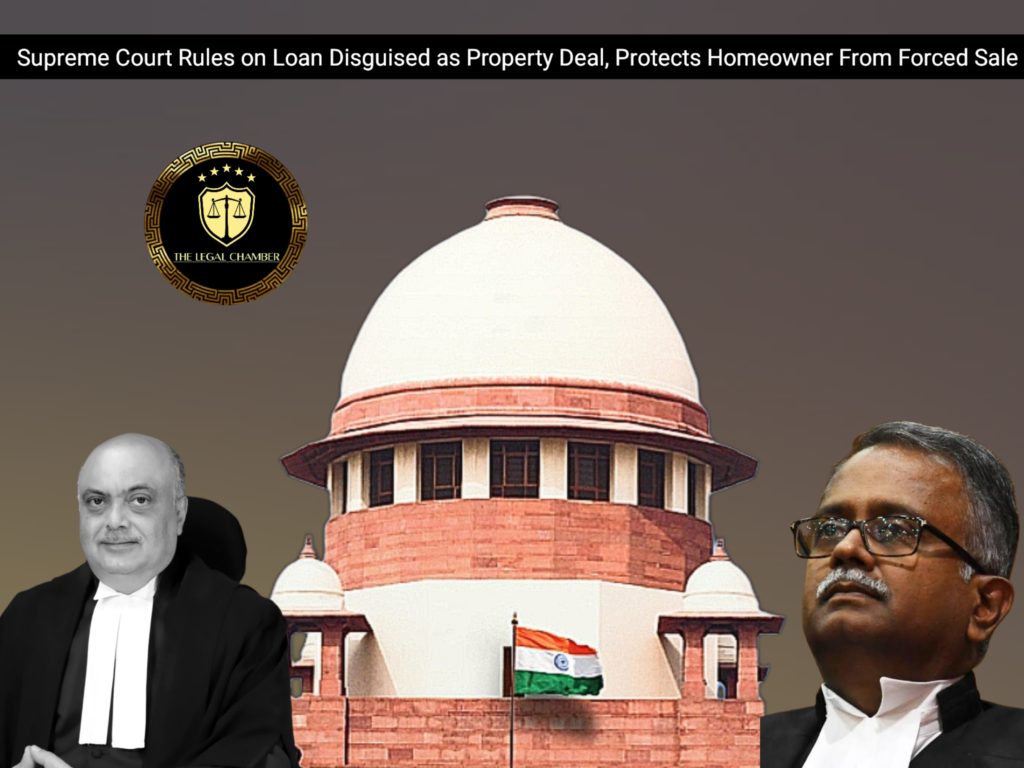
The Supreme Court held that the plaintiff failed to prove the existence of a valid sale agreement, a prerequisite for specific performance under Man Kaur v. Hartar Singh Sangha. The burden of proof was not discharged as the sole evidence was self-serving and key witnesses were not examined. The High Court’s reversal of concurrent factual findings was erroneous.
Facts Of The Case:
The respondents (original plaintiffs) filed a suit for specific performance of an alleged sale agreement dated 12.02.1999, claiming the appellant (defendant) had agreed to sell his house for Rs. 70,000. They asserted having paid Rs. 55,000 as advance and taken possession, subsequently renting the property back to the appellant. The appellant contested the suit, denying any agreement to sell. His defense was that the respondents were moneylenders from whom he had borrowed Rs. 50,000, and they had obtained his signatures on blank stamp papers under the guise of loan documentation. He claimed this fabricated agreement was misused to file the suit after he repaid the loan. The Trial Court and First Appellate Court dismissed the suit, finding the agreement not genuine and the respondents’ evidence unreliable. However, the High Court, in a second appeal, reversed these concurrent findings, granting the decree for specific performance upon noting the appellant’s admitted signatures and handwritten endorsements on the document. The Supreme Court was thus appealed to examine the legality of this reversal.
Procedural History:
The suit for specific performance was initially dismissed by the Trial Court. This dismissal was upheld by the First Appellate Court, which concurred with the findings that the plaintiffs failed to prove the execution of a valid sale agreement. The plaintiffs then filed a Second Appeal (RSA) before the High Court of Punjab and Haryana. The High Court allowed the appeal, reversing the concurrent findings of the two lower courts and decreeing the suit in favour of the plaintiffs. The defendant then appealed to the Supreme Court under Article 136 of the Constitution of India, which ultimately set aside the High Court’s judgment and restored the decree of the lower courts, albeit while moulding the relief.
READ ALSO :Supreme Court Acquits Man: “Confession to Police” Cannot Be Used as Evidence
Court Observation:
The Supreme Court observed that the plaintiff’s evidence for the sale agreement was self-serving and insufficient to discharge the burden of proving a valid contract, as the attesting witnesses were never examined. It held that the High Court erred in reversing the concurrent factual findings of the lower courts, which is impermissible in a second appeal. The Court reiterated the essential ingredients from Man Kaur v. Hartar Singh Sangha for specific performance, noting the plaintiff’s failure to prove the agreement’s existence was fatal. However, based on the appellant’s admission of borrowing, the Court moulded the relief and directed him to pay Rs. 3,00,000 to the respondents in lieu of the debt.
Final Decision & Judgement:
The Supreme Court allowed the appeal and set aside the impugned judgment of the High Court. It held that the respondents had failed to prove the existence of a valid agreement of sale, which is essential for granting specific performance. However, based on the appellant’s admission of having borrowed money, the Court moulded the relief and directed the appellant to pay a sum of Rs. 3,00,000 to the respondents within four weeks, thereby providing equitable compensation in lieu of the admitted debt. The decrees of the Trial Court and First Appellate Court dismissing the suit were effectively restored.
Case Details:
Case Title: Harish Kumar vs. Amar Nath and Another (Both Dead and Represented Through LR.) CITATION: 2025 INSC 924 Appeal No.: Civil Appeal Nos. 308 of 2015 Date of Judgement: August 05, 2025 Judges/Justice Name: Justice Ahsanuddin Amanullah and Justice S.V.N. Bhatti
Download The Judgement Here